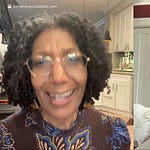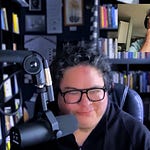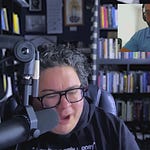Dear Substack Community: Below is my sermon. Above is the audio. I hope you enjoy these Sunday posts! Also, if you’re not reading The Cottage with Diana Butler Bass , you are missing out!
Paz, —RCE+
March 30, 2025 Sermon: Practicing Freedom: Wisdom—Knowing Otherwise
Week 2 of the Practicing Freedom Series
Scripture: James 3:13–18 (NRSVUE)
“Who is wise and understanding among you? Show by your good life that your works are done with gentleness born of wisdom… But the wisdom from above is first pure, then peaceable, gentle, willing to yield, full of mercy and good fruits, without a trace of partiality or hypocrisy.”
As we continue our Practicing Freedom series, today we turn to wisdom—not as a static answer or a distant ideal, but as a lived practice that frees us. In a world that often confuses noise for knowledge and speed for progress, wisdom slows us down. It helps us listen more deeply, imagine more wildly, and live more truly. Thinkers like Harris III and Michael McRay speak of the “wisdom economy” and an emerging “age of imagination,” where wonder, story, and spiritual depth are forms of resistance. Practicing wisdom is how we refuse the tyranny of certainty and make room for mystery—for the Spirit to move in us and through us.
I’ve been in this pulpit a little over a year, and we are still making one another. Transitions take time and effort. And, the time and effort that is required for our community is to ask ourselves what virtues form us?
I started this practicing freedom by addressing humility. How do we move through the world like Micah 6:8 calls us to move? Likewise, wisdom is another virtue that I think we should explore. I am constantly learning new things, learning about the Burned Over District, and learning about Alfred’s history. Who are the wise ones who will rise up right now?
I started this series, because I was curious what virtues we need to take this church to the future. What even does the future mean to us right now? In addition to this, I have been using language like empire, and I want to define empire for each of you today.
When we speak of “empire,” we’re not just talking about ancient Rome or any one government or nation. Empire is a way of organizing the world that prioritizes control, domination, and fear—where power is hoarded, difference is punished, and imagination is shut down. It’s a system, not just a place. And we all live in its shadows in some way. But the gospel invites us into something different—a wisdom that sets us free, a way of being rooted in love, community, and trust in the Spirit. Today, as we explore wisdom, we ask: what does it mean to live outside of empire’s logic and inside the imagination of God?
⸻
Introduction: What Counts as Wisdom?
There’s a kind of wisdom the world rewards—
The kind that gets you a bigger paycheck,
The kind that builds a résumé,
The kind that can speak smoothly, defend your position, and win the argument.
But James offers us another kind of wisdom—
One that is gentle, peaceable, willing to yield.
A wisdom born not from ambition, but from mercy.
A wisdom not proven in speeches or success,
But in how we live and how we love.
So let’s begin with a question:
What kind of wisdom are we cultivating here, as a community practicing freedom?
⸻
Part I: The Wisdom of Empire vs. the Wisdom of God
Theologians like Wes Howard-Brook and Néstor Míguez remind us that empire teaches us how to know in order to control.
Empire says:
• “You’re wise if you know how to win.”
• “You’re wise if you know how to rise through the ranks.”
• “You’re wise if you can outsmart the system—play the game and come out on top.”
But scripture says, again and again, that the wisdom of God looks like foolishness to the world.
It’s the wisdom of shepherds over kings, midwives over pharaohs,
The wisdom of Jesus riding on a donkey, not a warhorse.
Empire rewards cleverness, but the gospel calls us to wisdom.
And they are not the same.
⸻
Part II: Knowing Otherwise
Liberation theology calls us to “know otherwise.”
Not with the detached knowledge of the powerful,
But with the embodied knowledge of the oppressed.
Knowledge that doesn’t come from a book, but from life—
From survival, from struggle, from joy, from resistance.
This is what Latin American theologians call saber popular—people’s knowledge.
It’s the wisdom that lives in the hands of the farmer,
The grandmother who remembers how to stretch a meal,
The organizer who knows how to keep people safe.
This wisdom doesn’t climb the ladder. It holds the ladder steady so others can rise.
It doesn’t shout in the streets of empire.
It whispers in kitchens, sings in protest songs, and gathers around communion tables.
⸻
Part III: The Wisdom of the Fugitives
Fugitive wisdom is born in motion.
It’s the wisdom of people who had to run to be free—
Who carried knowledge in their bodies
Because books could be burned
And schools could be segregated
And truth could be silenced.
It’s the wisdom of Black spirituals that encoded directions to freedom,
Of queer communities who passed down survival tips in whispered tones,
Of Anabaptists who met underground, in caves and barns,
Reading scripture by candlelight and daring to believe that another way was possible.
That’s wisdom:
Not just knowing facts,
But knowing how to live—really live—
When the world is set up to crush your spirit.
⸻
Part IV: The Wisdom of Jesus
Jesus didn’t come teaching doctrines.
He came telling stories.
Stories about seeds and yeast and lost coins.
He taught wisdom, not from scrolls, but from the soil.
He showed people how to see differently.
He said:
• The last will be first.
• The poor are blessed.
• The meek will inherit the earth.
Jesus didn’t argue with empire—he outlived it.
His wisdom was resurrection-shaped.
It looked like foolishness to Pilate and Herod,
But it looked like truth to Mary Magdalene in the garden.
That is the kind of wisdom we are called to live.
⸻
Part V: Wisdom as a Communal Practice
In our context—here in this church, here in Alfred—
Wisdom isn’t just about the preacher having the right words.
It’s about how we listen to one another.
How we make decisions together.
How we trust the Spirit that speaks not just through pulpits,
But through potlucks, and quiet conversations, and shared tears.
Anabaptist theology teaches us that wisdom is communal.
No one person holds all the truth.
That’s why we slow down.
That’s why we discern together.
That’s why we listen for the voice of the Spirit not just in scripture,
But in the lives and stories of one another.
⸻
Part VI: Practicing the Wisdom of Freedom
So what does this mean for us?
It means that wisdom will often lead us away from the center of power.
It will ask us to slow down when the world says “hurry up.”
It will ask us to listen when the world says “speak louder.”
It will ask us to yield, to trust, to root down in community
Rather than rise up in competition.
And this wisdom is what makes freedom sustainable.
Because freedom without wisdom becomes chaos.
But wisdom—gentle, peaceable, Spirit-led—
Builds the beloved community.
⸻
Practice for the Week
This week, I invite you to ask yourself:
Where is wisdom showing up in my life right now—unexpectedly?
• In a quiet moment of rest?
• In the voice of someone I’ve overlooked?
• In something old I’m starting to see with new eyes?
Let’s commit to listening.
Let’s become a people who know otherwise.
⸻
Closing Words
The world is full of noise.
But the Spirit is still speaking.
Wisdom is not far off.
She is waiting for us—
In the silence,
In the soil,
In the stories we share,
And in the way we choose to live together,
Gently, courageously, and free.
Amen.
Day 25: The Burden of Control
We exhaust ourselves trying to manage every detail of our lives. Jesus invites us to let go. What would it mean for you to surrender control today?












